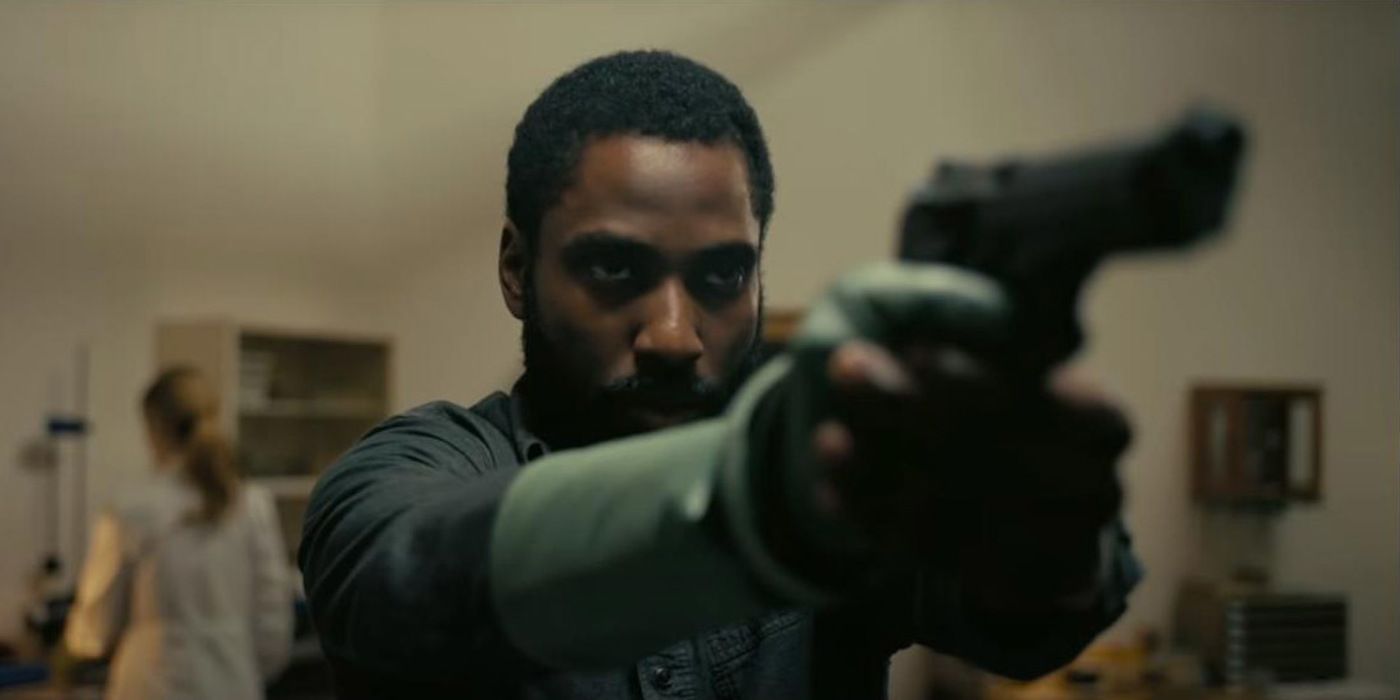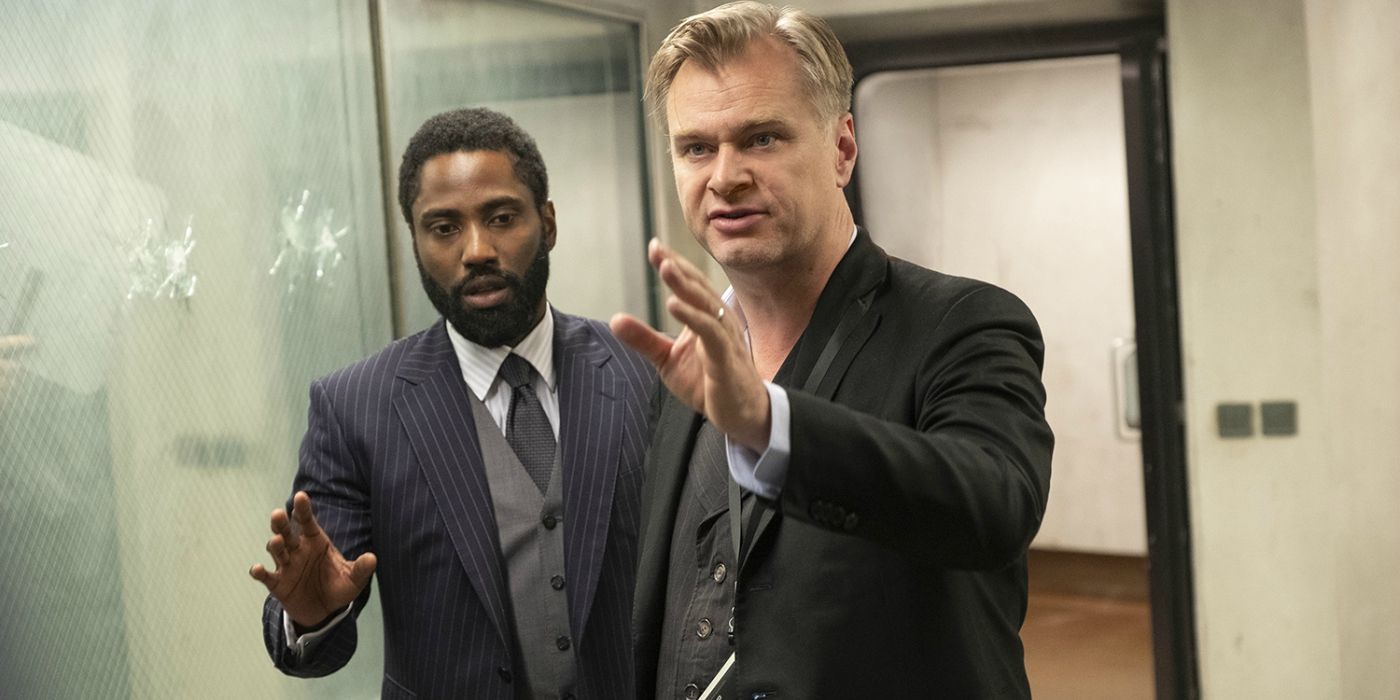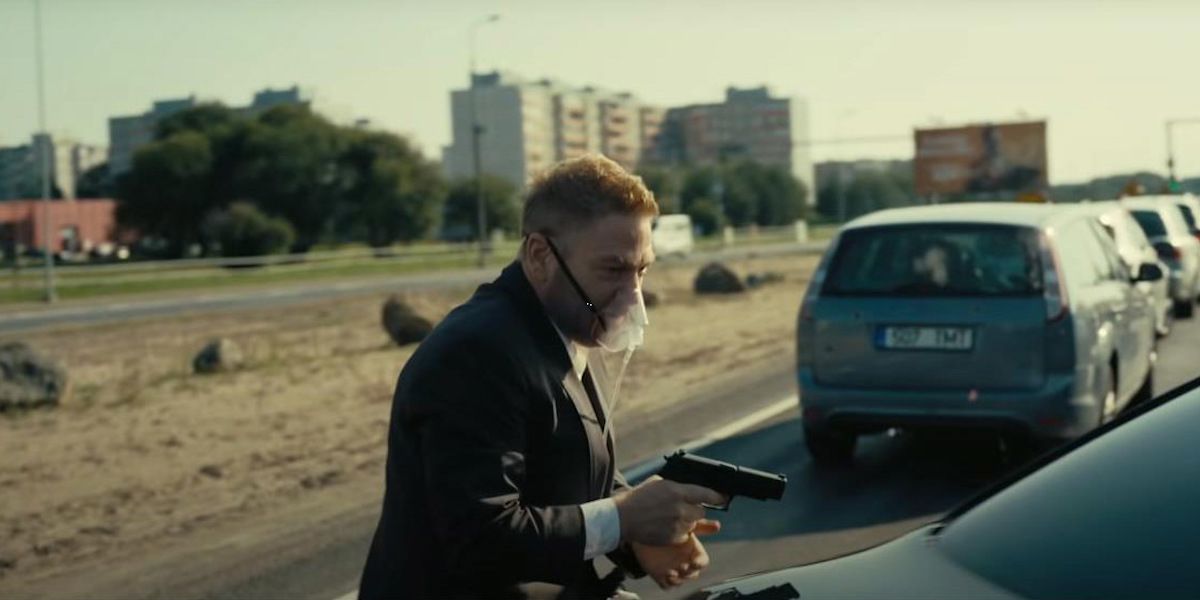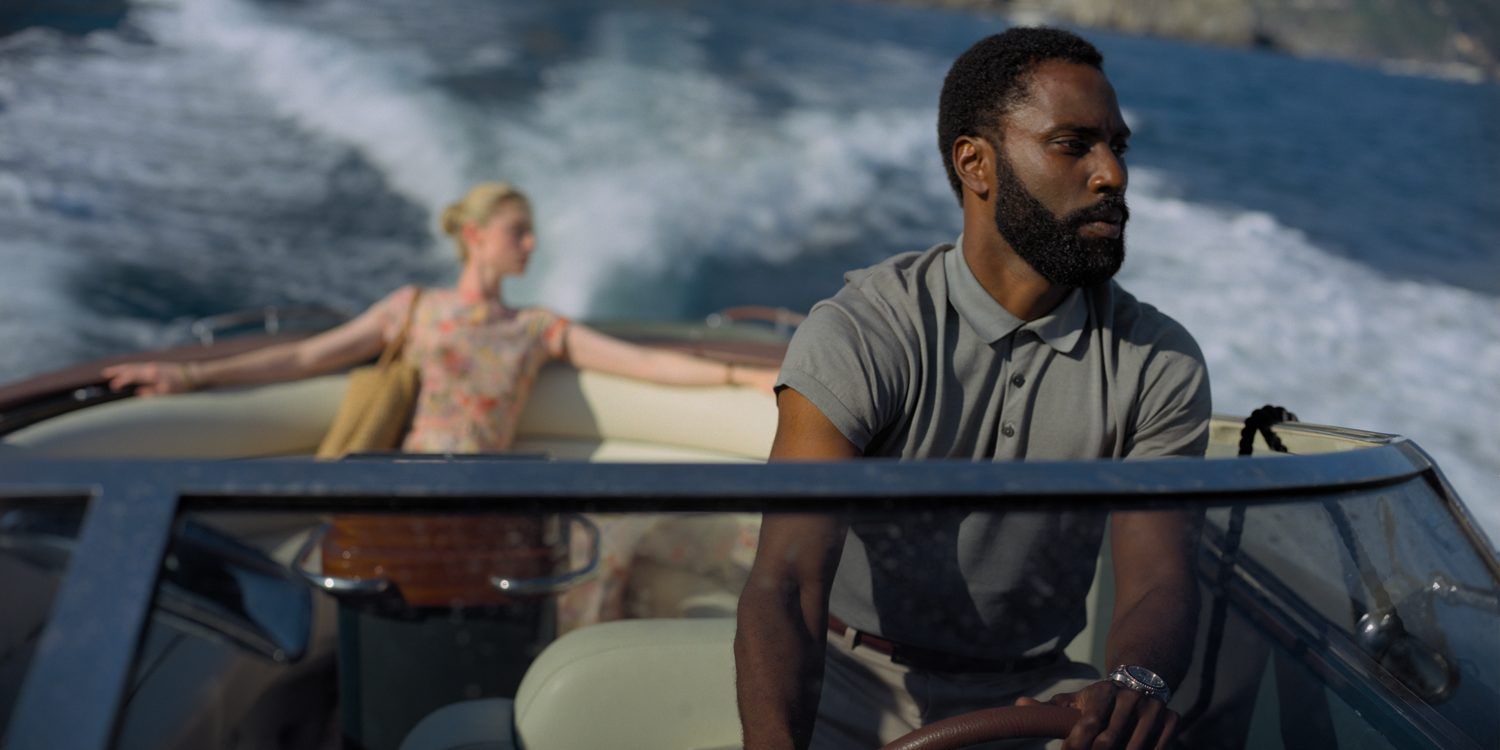The first time we see John David Washington, the Protagonist of Tenet (capitalized because his name is literally Protagonist), he silently reloads a gun, flings an empty bullet shell into the air, and catches it, all while giving a performative scowl. The first line Washington says in Tenet is the self-consciously “badass” code sentence, “We live in a twilight world.”
In this pair of character introductions, from the physical to the auditory, writer/director Christopher Nolan announces exactly what kind of movie Tenet is: A big one. A silly one. Less The Prestige, more The Fast and the Furious: Tokyo Drift. Tenet is an action-thriller with fun practical stunts, a spy movie that trots its beautiful people wearing beautiful clothes around beautiful places, a blockbuster whose broadly-staged set pieces sometimes have a gimmick where some people move backwards and some people move forwards. It’s a propulsive, plot-driven caper that expands the kinds of tropes we see in these kinds of movies to a pure, methodically crystallized form, with the novelty of this one high-concept “backwards/forwards” idea as the selling point; almost perversely uninterested in interrogating any of these tropes beyond what we can observe on the surface. It is not the kind of high art-low art crossover award show play Nolan made with The Dark Knight, Inception, or Dunkirk. It is — and I mean this as a giant, IMAX-sized compliment — incredibly stupid.
So why did Nolan treat it like it’s the most serious film ever made? Why couldn’t he lean into his film’s B-movie sensibilities, infusing it with more explicit fun, self-aware chutzpah, joy? Why can’t Nolan get out of his own way?
Part of this image of Tenet’s status as an Important Movie is extratextual, to be sure. Nolan is seen as a Serious Auteur, a guy whose predilections for Actual Film and Practical Stunts and Smart Ideas and No One Being Allowed To Sit In Chairs gives him an air of mythos no matter what he does. Furthermore, Nolan makes Event Movies that Film Fans love to Dissect, even (especially?) before it’s actually released. And in this case, the pre-release window was atypically extended, shifted, and eventually fizzled. It had the bad luck of coming out during a global pandemic where nobody wanted to go sit in a movie theater, and Nolan/WB had the bad stubbornness to insist on debuting it in a movie theater anyway, resulting in a ton of release date shifts, the releasing of even more behind-the-scenes discussions to keep buzz happening, and the ultimate conclusion of not many people really seeing it, either because their local movie theater simply wasn’t open, or because they didn’t want to risk getting sick. I believe this extratextual narrative of Nolan’s Mythological Hubris Being Deflated By Reality played no small part in the film’s muted critical response for those who did see it. It feels good to dunk on a man who so stubbornly insisted that his Important Movie was more important than safety; the movie’s quality or lack thereof can almost feel inconsequential, given this mystique surrounding it is more culturally ubiquitous.
To be fair: The movie itself is also guilty, at least superficially, of taking itself Very Seriously — and if you accept that this is a fundamentally superficial film by design, it’s understandable if that’s all one can engage with and get grumpy about. The opening set piece takes place at the opera — an immediate meta-textual argument that Nolan’s work is akin to a splendorous night at our most exalted of cultural institutions; a sort of high-art time inversion of the football game sequence in The Dark Knight Rises. A group of gun-wielding baddies immediately invade the opera, and the first things they do — knock over the instruments of the players and then put the entire audience to sleep — prompt guttural laughter from me, so unnecessarily dramatic are these evil actions. But Nolan either seems unaware of the inherent fun, even comedy in his big-budget brawls, or seems determined to coat it in as much seriousness as possible. Some of this seriousness is welcome: I appreciate how seriously the craftspeople like DP Hoyte van Hoytema, editor Jennifer Lame, and especially composer Ludwig Göransson take their crafts, yielding sound and images and sequences that feel like Nolan’s other work while also striking their own bold identity. But other elements of the film’s seriousness can hamstring itself, seeming at odds with the explicitly textual “don’t take this seriously” of the film’s screenplay and messaging.
For a screenplay so obsessed with plot, with procedure, with mechanics, with The Power Of The Idea triumphing over The Power Of The Human, Tenet does not want us to look beneath the hood of its plot, its procedure, its mechanics. Nolan has built us one hell of a sports car, and tells us throughout, using his various trope-inhabiting surrogate characters (again, Idea > Human), that to even think about opening its hood is an unnecessary burden on us plebeian viewers. “Don’t try to understand it. Feel it,” instructs Washington’s Q-type (Clémence Poésy) to him when his brain is boggled seeing a bullet fly into a gun for the first time (a genuinely pleasing sequence). “In the know and you don’t. Any other stupid questions?” barks Aaron Taylor-Johnson as a gruff military commander when someone dares ask how the climactic action sequence is supposed to work. At one point, Kenneth Branagh’s melodramatically villainous Russian arms dealer taunts the Protagonist by saying, “You fight for a cause you barely understand, with people you trust so little you’ve told them nothing about what you’re doing,” and he is correct.
I’m not going to lie, this paradoxical misalignment of “super-serious dialogue all about logistics that insists we should stop caring about logistics” is not a small hurdle to overcome. But if you are willing to jump it, you will start to find the pleasure and intention behind this puzzling ratio, its yearning to look past all of this expositional, idea-driven sound and fury and dive straight into the heart. How do we know this? Because at one point, the Protagonist looks past all of the expositional, idea-driven sound and fury to ask, explicitly, “But what does your heart tell you?”
Tenet is Nolan’s most romantic, most optimistic, most hopeful, and most playful movie, full stop. Washington’s charisma can be seen from damn outer space, and Nolan seems to know this, giving him one-liners like “I ordered my hot sauce an hour ago” before annihilating the hell out of a group of baddies in a kitchen, cutting through the screen with physical command, telling his audience, “Excuse me, I am a movie star now, please treat me accordingly.” Göransson’s score plays like a pop-trap version of Hans Zimmer’s synth-low-brass “bwooomps”, and when it swells up and starts knocking to a beat to punch each hypnotic, time-warping action sequence, my brain does, indeed, shut off and I do “feel it”. While it takes its time to dive under the initial motivations of each character beyond how they relate to “a movie”, its final moments between Branagh, Washington, and Elizabeth Debicki absolutely get there, giving us a stunning piece of explicit social commentary that no other Nolan film has ever given me before, one that speaks to an an existential anxiety I deal with on the regular.
Branagh’s evil plot is tied to the horrific thought that climate change will destroy us all, and will destroy us all soon. “Their oceans rose and their rivers ran dry. We’re responsible,” he says of the generations we’ve doomed. “My greatest sin was bringing a son into a world I knew was ending. Think God will forgive me?” Washington and Debicki’s responses are full of such pure hope and such pure catharsis, respectively, that I can’t help but get swept up in the giant symbolism of their individual actions. Ideas and Humans finally become equal, a lovely sentiment summarized explicitly by Robert Pattinson: “What’s happened happened. Which is an expression of faith in the mechanics of the world. It’s not an excuse to do nothing.” Tenet has smuggled a heartfelt plea for the human race’s inherent goodness into a “Christopher Nolan Film” Trojan horse, granting that we want the mind-bending prestige-blockbuster shenanigans, but pleading that we pay less attention to them than to the gooey, sentimental, silly center. It’s a strategy that ultimately pays off.
By the time Washington says “I’m the Protagonist,” a mind-bogglingly silly line, with the committed badass-ness of twelve action stars smushed together, I am literally pumping my fists in the air and shouting. I can’t wait for the day Tenet can step out of all of its shadows, can stop living in the twilights created both by itself and others, and be appreciated for the immaculately constructed, puzzlingly self-serious, loudly hopeful, and grandstandingly delirious piece of camp action cinema that it is.




